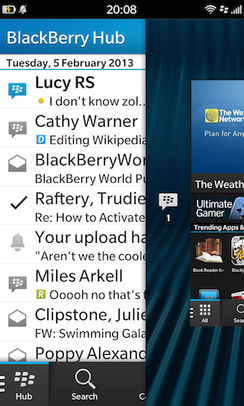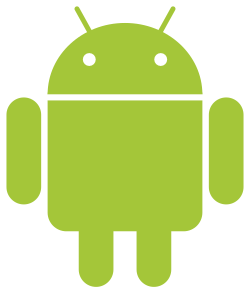A software development kit (SDK) is a collection of software development tools in one installable package. They facilitate the creation of applications by having a compiler, debugger and sometimes a software framework. They are normally specific to a hardware platform and operating system combination. To create applications with advanced functionalities such as advertisements, push notifications, etc; most application software developers use specific software development kits.

A hackathon is an event where people engage in rapid and collaborative engineering over a relatively short period of time such as 24 or 48 hours. They are often run using agile software development practices, such as sprint-like design wherein computer programmers and others involved in software development, including graphic designers, interface designers, product managers, project managers, domain experts, and others collaborate intensively on engineering projects, such as software engineering.
Android is a mobile operating system based on a modified version of the Linux kernel and other open-source software, designed primarily for touchscreen mobile devices such as smartphones and tablets. Android is developed by a consortium of developers known as the Open Handset Alliance, though its most widely used version is primarily developed by Google. It was unveiled in November 2007, with the first commercial Android device, the HTC Dream, being launched in September 2008.
A mobile development framework is a software framework that is designed to support mobile app development. It is a software library that provides a fundamental structure to support the development of applications for a specific environment.
Apache Cordova is a mobile application development framework created by Nitobi. Adobe Systems purchased Nitobi in 2011, rebranded it as PhoneGap, and later released an open-source version of the software called Apache Cordova. Apache Cordova enables software programmers to build hybrid web applications for mobile devices using CSS3, HTML5, and JavaScript, instead of relying on platform-specific APIs like those in Android, iOS, or Windows Phone. It enables the wrapping up of CSS, HTML, and JavaScript code depending on the platform of the device. It extends the features of HTML and JavaScript to work with the device. The resulting applications are hybrid, meaning that they are neither truly native mobile application nor purely Web-based. They are not native because all layout rendering is done via Web views instead of the platform's native UI framework. They are not Web apps because they are packaged as apps for distribution and have access to native device APIs. Mixing native and hybrid code snippets has been possible since version 1.9.

Android software development is the process by which applications are created for devices running the Android operating system. Google states that "Android apps can be written using Kotlin, Java, and C++ languages" using the Android software development kit (SDK), while using other languages is also possible. All non-Java virtual machine (JVM) languages, such as Go, JavaScript, C, C++ or assembly, need the help of JVM language code, that may be supplied by tools, likely with restricted API support. Some programming languages and tools allow cross-platform app support. Third party tools, development environments, and language support have also continued to evolve and expand since the initial SDK was released in 2008. The official Android app distribution mechanism to end users is Google Play; it also allows staged gradual app release, as well as distribution of pre-release app versions to testers.

BlackBerry 10 (BB10) was a proprietary mobile operating system for the BlackBerry line of smartphones, both developed by BlackBerry Limited. Released in January 2013, BlackBerry 10 is a complete rework from the company's previous BlackBerry OS software.
A mobile application or app is a computer program or software application designed to run on a mobile device such as a phone, tablet, or watch. Mobile applications often stand in contrast to desktop applications which are designed to run on desktop computers, and web applications which run in mobile web browsers rather than directly on the mobile device.
Android Developer Lab is a series of mobile software development-focused events around the world held annually by Google. They include bootcamps and technical sessions focused on Android and give participants an excellent chance to learn about the state of the Android platform, get hands-on with the latest version of the SDK, test applications on the latest sample Android devices, get questions answered by Google engineers from the Android team as well as meet other like-minded members of the local Android developer community.

Google Play, also known as the Google Play Store or Play Store and formerly Android Market, is a digital distribution service operated and developed by Google. It serves as the official app store for certified devices running on the Android operating system and its derivatives, as well as ChromeOS, allowing users to browse and download applications developed with the Android software development kit and published through Google. Google Play has also served as a digital media store, offering games, music, books, movies, and television programs. Content that has been purchased on Google Play Movies & TV and Google Play Books can be accessed on a web browser and through the Android and iOS apps.

Sailfish OS is a paid Linux-based operating system based on free software, and open source projects such as Mer as well as including a closed source UI. The project is being developed by the Finnish company Jolla.

The Guardian Project is a global collective of software developers, designers, advocates, activists, and trainers who develop open-source mobile security software and operating system enhancements. They also create customized mobile devices to help individuals communicate more freely and protect themselves from intrusion and monitoring. The effort specifically focuses on users who live or work in high-risk situations and who often face constant surveillance and intrusion attempts into their mobile devices and communication streams.
Testdroid is a set of mobile software development and testing products by Bitbar Technologies Limited.
Google Cast is a proprietary protocol developed by Google for playing locally stored or Internet-streamed audiovisual content on a compatible consumer device. The protocol is used to initiate and control playback of content on digital media players, high-definition televisions, and home audio systems using a mobile device, personal computer, or smart speaker. The protocol was first launched on July 24, 2013, to support Google's first-generation Chromecast player. The Google Cast SDK was released on February 3, 2014, allowing third parties to modify their software to support the protocol. According to Google, over 20,000 Google Cast-ready apps were available as of May 2015. Support for Google Cast has since been integrated into subsequent devices, such as the Nexus Player and other Android TV devices, as well as soundbars, speakers, and later models of the Chromecast. Consumer devices that natively support the protocol are marketed as Chromecast built-in. As of October 2017, over 55 million Chromecasts and Chromecast built-in devices have been sold.
Google Play Services is a proprietary software package produced by Google for installation on Android devices. It consists of background services and libraries for use by mobile apps running on the device. When it was introduced in 2012, it provided access to the Google+ APIs and OAuth 2.0. It expanded to cover a variety of Google services, allowing applications to communicate with the services through common means.

Tango was an augmented reality computing platform, developed and authored by the Advanced Technology and Projects (ATAP), a skunkworks division of Google. It used computer vision to enable mobile devices, such as smartphones and tablets, to detect their position relative to the world around them without using GPS or other external signals. This allowed application developers to create user experiences that include indoor navigation, 3D mapping, physical space measurement, environmental recognition, augmented reality, and windows into a virtual world.
Firebase is a set of backend cloud computing services and application development platforms provided by Google. It hosts databases, services, authentication, and integration for a variety of applications, including Android, iOS, JavaScript, Node.js, Java, Unity, PHP, and C++.
Flutter is an open-source UI software development kit created by Google. It can be used to develop cross platform applications from a single codebase for the web, Fuchsia, Android, iOS, Linux, macOS, and Windows. First described in 2015, Flutter was released in May 2017. Flutter is used internally by Google in apps such as Google Pay and Google Earth as well as by other software developers including ByteDance and Alibaba.

Huawei AppGallery is a package manager and application distribution platform, or marketplace 'app store', developed by Huawei Technologies Co., Ltd. It serves as the official app store for the devices running on Huawei HarmonyOS, and is also available for Huawei EMUI and Microsoft Windows via the Mobile Engine emulator.









